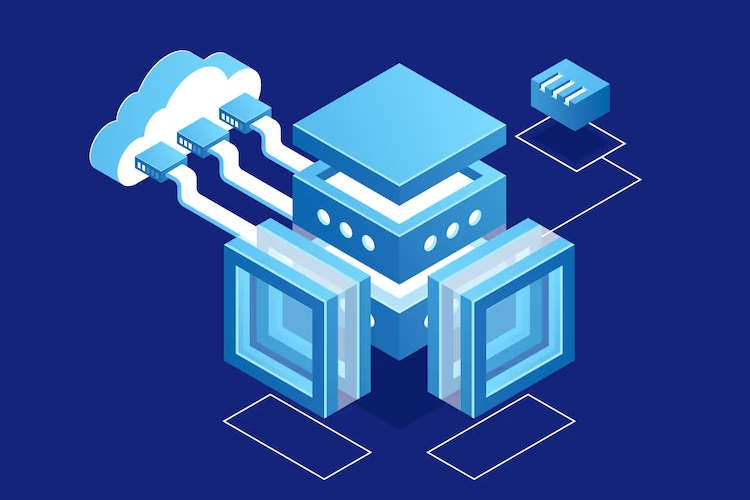It is not surprising that blockchain technology is being employed in every sector, from banking and finance to healthcare and manufacturing, given that global spending on blockchain solutions has reached $6.6 billion.
Similar to how the cloud has become a crucial component of business infrastructure, blockchain is expected to do the same. The most typical application of blockchain in businesses is secure information sharing.
Despite these two technologies being in the early phases of development and acceptance, there are currently a number of ways they can be merged to produce new services and improve ones that already exist.
In this post, we’ll examine blockchain’s application in cloud computing and its benefits for businesses.
Difference Between Blockchain and Cloud Computing
Although they can complement one another in some applications, blockchain and cloud computing are two separate technologies with different functions.
Blockchain, also popularly known as distributed ledger technology, makes it possible for several participants or nodes to keep track of transactions in a secure and transparent manner. It seeks to offer integrity, trustworthiness, and immutability when storing and confirming data. Blockchain relies on a peer-to-peer network in which numerous users, or nodes, uphold and verify the shared ledger.
The supply of computer services, such as storage, processing power, and applications, through the internet is referred to as cloud computing, on the other hand. Users are able to use computing resources that are often offered by a third-party service provider on demand. Cloud computing uses centralized infrastructure, where the underlying hardware and software resources are owned and managed by a service provider. Depending on their demands, users can scale up or down their computing capacity while only paying for what they really use.
The main distinctions between cloud computing and blockchain are found in their centralization, architecture, and goals. While cloud computing offers centralized computer resources on demand, blockchain focuses on decentralized and trustless record-keeping. Even though they have various applications, they can be merged in some situations.
Blockchain technology can revolutionize cloud computing platforms by providing enhanced data security and transparency. Additionally, it can be used to create decentralized applications (DApps) that leverage blockchain’s features while utilizing cloud-based infrastructure. By utilizing blockchain in cloud computing, businesses can ensure the security of their data while also leveraging the benefits of cloud-based infrastructure.
5 Ways How Blockchain Enhances Cloud Computing
Blockchain can improve cloud computing in a number of ways, adding more security, transparency, and trust to various cloud infrastructure components. The following are some significant ways that blockchain can improve cloud computing:
Data Security and Integrity
The decentralized, unchangeable nature of blockchain technology can give an extra degree of security to cloud data. Blockchain technology can guard against unauthorized access, data loss, and tampering by storing data in a distributed ledger. By generating a transparent audit trail of any modifications made to the data that is saved, it guarantees the integrity of the data.
Smart Contracts and Cloud Service Automation
Automation of cloud services using smart contracts is possible thanks to blockchain technology’s ability to create self-executing contracts. Smart contracts can automate the provisioning, billing, and management of cloud services, reducing the need for middlemen and increasing productivity. These self-executing contracts can guarantee the fulfillment of predetermined requirements and the safe and transparent execution of transactions.
Collaboration and Data Sharing
In a cloud context, blockchain facilitates the secure and open sharing of data between numerous parties. It guarantees data integrity and traceability while enabling users to maintain and keep control over their data and set access rights. Smart contracts built on the blockchain can automate data exchange and cooperation procedures, obviating the need for middlemen and increasing productivity.
Decentralized Cloud Storage
Systems for decentralized cloud storage can be built using blockchain technology. Users can store their data among several nodes in a blockchain network instead of depending on centralized cloud services, ensuring redundancy and lowering the risk of data loss or outage. The availability, dependability, and cyber resilience of data can all be improved by using distributed storage.
Identity and Access Management
Blockchain technology can enhance identity and access management (IAM) in cloud computing. It makes it possible to build a decentralized identification system in which people are in charge of their identities and personal information. Users that don’t want to rely on centralized identity providers can securely access cloud services by employing blockchain-based identity verification and authentication techniques.
Auditing and Compliance
Blockchain is helpful for auditing and compliance in cloud computing because it provides a visible and unchangeable record of transactions. Organizations can demonstrate regulatory compliance and carry out thorough audits, assuring data integrity and accountability, by documenting all operations and changes to data or configurations on the blockchain.
Cloud Marketplace and Service Provisioning
Blockchain can facilitate peer-to-peer transactions and automate service provisioning in cloud markets. It eliminates middlemen, lowers transaction costs, and improves openness and confidence between cloud service providers and customers. The negotiation, execution, and payment of cloud services can be automated with smart contracts, resulting in smooth and effective transactions.
Benefits of Blockchain in Cloud Computing
Numerous characteristics of blockchain can improve the efficiency and security of cloud-based systems. The following are some of the noteworthy perks of utilizing blockchain technology in cloud computing:
Higher Security
The fact that blockchain technology is very secure is one of its most important benefits. Instead of being secured in a single place, data is now kept in ledgers spread over a network of computers thanks to blockchain technology.
It is practically impossible for hackers to break into the system and alter data because of the decentralized architecture. Additionally, before being entered into the ledger, each transaction is authenticated and verified by the network, making it nearly impossible to perpetrate fraud.
Better Traceability
Blockchain can also help cloud-based systems with traceability. Each transaction is tracked and recorded in a public ledger using blockchain technology.
Businesses that work with sensitive data, including those in the healthcare and financial industries, must have traceability. Companies may ensure that the data is secure and secret by keeping track of every transaction.
Superior Scalability
Additionally, blockchain technology is very scalable. Blockchain can be readily scaled up to accommodate more users and transactions because it is a distributed database. For instance, a business can increase the number of computers connected to the network in order to extend its cloud-based system to accommodate more users.
Cloud-based replication of blockchain data across a network of computer systems that are solidly connected to one another by collaborative clouds can aid with fault tolerance. As a result, the risks of a single failure due to the disruption of any cloud node will be reduced, enabling continuous services.
Increased Network Resilience
If you use cloud computing solutions globally, you have the flexibility to save data in different physical places. A calamity like a natural disaster is less likely to disrupt the services when the cloud computing network has adequate cloud storage in numerous places. The processing load is subsequently transferred from one system network node to another.
Use Cases of Blockchain in Cloud Computing
Check out a few top use cases of blockchain in cloud computing:
Healthcare
Blockchain in cloud computing has the potential to change the industry by allowing secure and seamless patient data sharing across healthcare providers. Blockchain technology can protect the confidentiality and privacy of data while giving patients access to and control over their medical records. Additionally, it can optimize pharmaceutical supply chain management, permit secure data sharing for research, and speed up the processing of health insurance claims.
Finance and Banking
Blockchain in cloud computing can improve the speed and security of financial transactions in the financial and banking sectors. Blockchain-based platforms can promote transparent and auditable financial transactions, enable faster and more secure cross-border payments, and eliminate intermediaries and transaction costs. Smart contracts have the potential to automate financial operations like loan disbursements and trade settlements, increasing efficiency and lowering fraud.
Intellectual Property Rights
Blockchain technology in cloud computing can improve the management and protection of intellectual property rights. Copyrights, patents, and trademarks can be recorded and managed in a transparent, tamper-proof ledger using blockchain-based technologies. It can offer evidence of ownership and timestamping for intellectual property, minimizing conflicts and enhancing the processes for granting licenses and allocating royalties.
Supply Chain and Logistics
Blockchain in cloud computing can improve supply chain and logistics operations’ transparency and traceability. Stakeholders may confirm the authenticity and provenance of items, lessen counterfeiting, and increase participant confidence by logging every stage of the supply chain on a blockchain. Smart contracts can automate payments and contract terms, enhancing transaction efficiency and lowering conflicts.
Real Estate
By digitizing and automating property transactions, blockchain in cloud computing might streamline the real estate market. Blockchain-based platforms can offer safe and transparent property records, which can cut down on fraud and facilitate quick property transactions. Rental agreements, property management, and escrow services can all be automated with smart contracts, which will increase transaction speed and accuracy.
Government Services
By increasing transparency, security, and efficiency, blockchain in cloud computing can improve government services. Secure voting systems, transparent and auditable public procurement procedures, and effective management of government archives and documents can all be made possible by blockchain-based platforms. Additionally, it can make it easier to store personal information and citizen identities in a safe and impenetrable manner.
Energy and Utilities
Peer-to-peer energy trade and grid management are made possible by blockchain in cloud computing, which has the potential to revolutionize the energy and utilities sector. Platforms built on the blockchain can make energy transactions transparent and decentralized, enabling customers to directly buy and sell extra energy to one another. Additionally, it may make it possible to measure and manage carbon credits and renewable energy production more effectively.
These instances highlight the numerous uses of blockchain in cloud computing across several industries and highlight its potential to raise security, transparency, efficiency, and trust in diverse fields.
Final Thoughts
Integration of blockchain with cloud computing and vice versa has huge potential. The most intriguing feature, though, is how these two technological paradigms might combine to open up hitherto unattainable potential.
To develop, run, and manage these new technologies, businesses must, however, employ the right technology partner who can offer robust cloud consulting services. By employing a reliable and robust technology partner, businesses can develop, run, and manage new technologies with ease.












